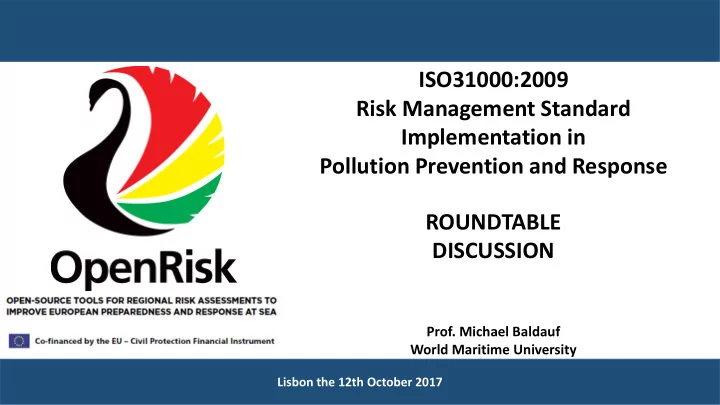

ISO31000:2009 Risk Management Standard Implementation in Pollution Prevention and Response ROUNDTABLE DISCUSSION Prof. Michael Baldauf World Maritime University Valtteri Laine Lisbon the 12th October 2017 Project Manager Captain/M.Sc.
ROUNDTABLE DISCUSSION: APPLICABILITY OF ISO31000 What is your opinion about using ISO31000:2009 standard as a guide for implementing risk management in PPR activities? PRINCIPLES FRAMEWORK PROCESS
ROUNDTABLE DISCUSSION: SCOPE OF RISK MANAGEMENT What should be the scope of the risk management? • OpenRisk focuses only on oil spill risk, mainly at prevention and response of oil spills (from WS1) • However, maritime risk is wider (air pollution, sewage, noise,…), and holistic (inter-)organizational risk management could combine risks, e.g. through a set of indicators for different risks, for integrated decision making (this could be a follow-up of OpenRisk) What are benefits / challenges of aiming at a larger risk PRINCIPLES FRAMEWORK PROCESS management scope?
ROUNDTABLE DISCUSSION: PROCESS OF RISK MANAGEMENT Periodic Strategic Intermittent €€ € €€€ What do you think of the 3-stage risk management process? • Aim is to monitor risk and facilitate decision-making on different time-scales, with different costs involved. Is this a good aim? • Do you think it is practicable to implement this? What are benefits / challenges? • Which organization(s) could take accountability for the different stages? (HELCOM/national authorities)? What about funding and resources for executing analyses?
ROUNDTABLE DISCUSSION: APPLICABILITY OF ISO31000 • ) Which type of risk management process do you associate most with your work/organization currently? • b) Do you think this type of risk management process suits your purpose? Would you like to adapt a different type of risk management? • c) Based on the discussion in the 1st and 2nd workshop, do you think the table accurately captures the different types of risk management processes? • d) Do you feel any types of risk management processes are missing from the table? • e) What improvements would you make to the table?
ROUNDTABLE DISCUSSION: PROCESS TABLE/FLOWCHART What is your view on the description of each risk management process stage? • Are the aims realistic? • What about time scales? • Should there be fixed risk evaluation criteria for each stage? Or should decision to go to next stage mainly be based on discussion between stakeholders? • Should the process prescribe specific tools to be used, or be flexible to account for existing approaches?
Recommend
More recommend